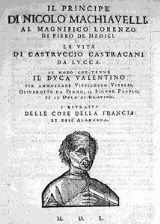
treatise
by the Italian diplomat
, historian
and political theorist
Niccolò Machiavelli
. From correspondence a version appears to have been distributed in 1513, using a Latin title, De Principatibus (About Principalities). But the printed version was not published until 1532, five years after Machiavelli's death. This was done with the permission of the Medici
pope
Clement VII, but "long before then, in fact since the first appearance of the Prince in manuscript, controversy had swirled about his writings".
Although it was written as if it were a traditional work in the Mirror of Princes style, it is generally agreed that it was especially innovative.
And so it is with State affairs. For the distempers of a State being discovered while yet inchoate, which can only be done by a sagacious ruler, may easily be dealt with; but when, from not being observed, they are suffered to grow until they are obvious to every one, there is no longer any remedy.![]()
[…]you ought never to suffer your designs to be crossed in order to avoid war, since war is not so to be avoided, but is only deferred to your disadvantage.![]()
For, besides what has been said, it should be borne in mind that the temper of the multitude is fickle, and that while it is easy to persuade them of a thing, it is hard to fix them in that persuasion. Wherefore, matters should be so ordered that when men no longer believe of their own accord, they may be compelled to believe by force.![]()
And here comes in the question whether it is better to be loved rather than feared, or feared rather than loved. It might perhaps be answered that we should wish to be both; but since love and fear can hardly exist together, if we must choose between them, it is far safer to be feared than loved.![]()
A Prince, therefore, if he is enabled thereby to forbear from plundering his subjects, to defend himself, to escape poverty and contempt, and the necessity of becoming rapacious, ought to care little though he incur the reproach of miserliness, for this is one of those vices which enable him to reign.![]()
A controversy has arisen about this: whether it is better to be loved than feared, or vise versa. My view is that it is deserable to be both loved and feared; but it is difficult to achieve both and, if one of them has to be lacking, it is much safer to be feared than loved.![]()
For of men it may generally be affirmed, that they are thankless, fickle, false studious to avoid danger, greedy of gain, devoted to you while you are able to confer benefits upon them, and ready, as I said before, while danger is distant, to shed their blood, and sacrifice their property, their lives, and their children for you; but in the hour of need they turn against you.![]()

